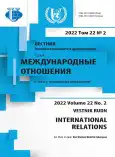International information security: In search of consolidated approaches : Interview with Andrey V. Krutskikh, Special Representative of the President of the Russian Federation for International Cooperation in the Field of Information Security. Interviewed by D. A. Piskunov
- Authors: Krutskikh A.V.1
-
Affiliations:
- Department of International Information Security of the Russian Ministry of Foreign Affairs
- Issue: Vol 22, No 2 (2022): Non-Western World in Cyberspace
- Pages: 342-351
- Section: SCIENTIFIC SCHOOL
- URL: https://journal-vniispk.ru/2313-0660/article/view/320547
- DOI: https://doi.org/10.22363/2313-0660-2022-22-2-342-351
- ID: 320547
Cite item
Abstract
Andrey Vladimirovich Krutskikh is the Special Representative of the President of the Russian Federation for International Cooperation in the field of Information Security since 2014, and a leading expert in this field in Russia and around the world. He served as Chairman of the UN Panel of Government Experts on Developments in the Field of Information and Telecommunications in the Context of International Security and the SCO Member States Panel of Experts on International Information Security (IIS). Since 2020, A.V. Krutskikh holds the position of Director of the Department for International Information Security (DIIS) of the Ministry of Foreign Affairs of Russia, since 2017 he is Director of the Center for International Information Security, Science and Technology Policy of MGIMO University. Andrey Vladimirovich is the author of fundamental works devoted to IIS issues, the scientific editor of the three volume comprehensive textbook “International Information Security: Theory and Practice,” prepared by the CIIS team of authors. During the interview A.V. Krutskikh spoke about Russia’s approaches to international information security, the role of our country in developing the rules of the responsible State behavior in the global information space.
About the authors
Andrey V. Krutskikh
Department of International Information Security of the Russian Ministry of Foreign Affairs
Author for correspondence.
Email: ir@rudn.ru
Special Representative of the President of the Russian Federation for International Cooperation in the Field of Information Security, Ambassador Extraordinary and Plenipotentiary, Acting Director of the Department of International Information Security of the Russian Ministry of Foreign Affairs
References
- Biryukov, A. V., & Alborova, M. B. (2019). Socio-humanitarian dimension of international information security. Moscow: Aspekt Press publ. (In Russian).
- Creemers, R. (2022). China’s cybersecurity regime: Securing the smart State. Leiden University. P. 1-38. Retrieved from https://papers.ssrn.com/sol3/papers.cfm?abstract_id=4070682
- Krutskikh, A. & Zinovieva, E. (Eds.). (2021). International information security: Russia’s approaches. Moscow.
- Krutskikh, A. V. (Ed.). (2019). International information security: Theory and practice : in 3 volumes. Moscow: Aspekt Press publ. (In Russian).
- Krutskikh, A. V. (Ed.). (2021). International information security: Theory and practice : in 3 volumes. Moscow: Aspekt Press publ. (In Russian).
- Krutskikh, A., & Biryukov, A. (2017). International science and technology relations as a new geopolitical reality. International Trends, (2), 6-26.
- Li, Zhi, & Tang, Runhua. (2020). Duo li yi you guan fang mo shi : gou jian quan qiu hu lian wang zhi li ti xi de lu jing yan jiu [Multistakeholder model: Pathway to a global Internet governance system]. Chuan mei guan cha [Media Observer], 444(12), 21-28. (In Chinese).
- Tikk, E., & Kerttunen, M. (Eds.). (2020). Routledge handbook of international cybersecurity. Routledge.
- Wang, Zheng. (2020). Lian he guo “shuang gui zhi” xia quan qiu wang luo kong jian gui ze zhi ding xin tai shi [Global internet governance towards a digital Cold war or digital commons]. Zhong guo xin xi an quan [Information security of China], 20(1), 40-43. (In Chinese).
- Xu, Peixi. (2021). 2020 shu zi leng zhan yuan nian: wang luo kong jian quan qiu zhi li de liang zhong lu xian zhi zheng [Year of the digital Cold war 2020: The battle of the two paths of global governance in cyberspace]. Xin xi an quan yu tong xin bao mi [Information Security and Communication Confidentiality], 21(3), 16-23. (In Chinese).
- Yan, Xuetong. (2020). Bipolar rivalry in the early digital age. The Chinese Journal of International Politics, 13(3), 313-341. https://doi.org/10.1093/cjip/poaa007
- Zinovieva, E. S. (2009). International internet governance: Conflict and cooperation. Moscow: MGIMO publ. (In Russian).
- Zinovieva, E. S. (2020). International information security: Problems of multilateral and bilateral cooperation. Moscow: MGIMO publ. (In Russian).
Supplementary files









